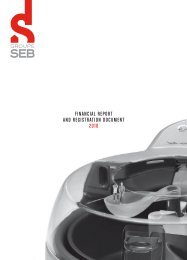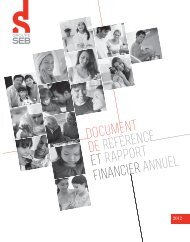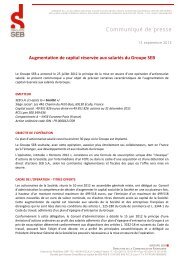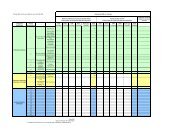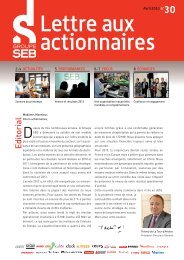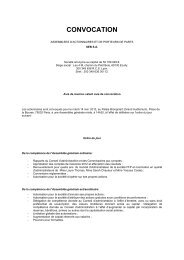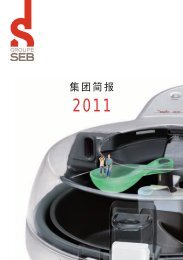Download the file. - Groupe Seb
Download the file. - Groupe Seb
Download the file. - Groupe Seb
Create successful ePaper yourself
Turn your PDF publications into a flip-book with our unique Google optimized e-Paper software.
Sustainable development 73<br />
Environment<br />
Eco-production: Ongoing improvement in factories<br />
As far as our environmental policy is concerned, according to Group data 79% of our<br />
factories are ISO 14001* certified (excluding Imusa and Asia Fan). New entities from acquisitions are<br />
also committed to this process. The Omegna (Italy) site was certified in 2011 and <strong>the</strong> Canonsburg (USA)<br />
and Supor (China) factories are aiming for certification in 2012.<br />
EFFYPACK: SMALL CHANGES, MAJOR EFFECTS<br />
“The EffyPACK project, launched in 2010 by <strong>the</strong> Logistics Department, aims to optimise <strong>the</strong> loading<br />
of transport units to reduce CO 2 emissions. The principle is to involve logistical constraints (pallet,<br />
lorry and container dimensions) from <strong>the</strong> product design stage onwards. Standard rules have been<br />
defined and circulated to everyone involved in <strong>the</strong> process. In this way, by modifying <strong>the</strong> dimensions<br />
of Actifry packaging by a few millimetres, <strong>the</strong> Is-sur-Tille (France) site has managed to increase its lorry<br />
load rate by 20% and reduce its CO 2 emissions by <strong>the</strong> same amount. EffyPACK was deployed worldwide in 2011<br />
and also covers sub-contracted products.”<br />
Minh Huong Nguyen Le, Analyst in <strong>the</strong> Logistics Department<br />
Eco-logistics: Lower CO 2 emissions<br />
In order to reduce CO 2 emissions linked with <strong>the</strong> transport of products and components,<br />
<strong>Groupe</strong> SEB is continuing to improve <strong>the</strong> load rate of transport units and to develop alternative<br />
solutions to road transport. This is <strong>the</strong> case in Brazil, for example, between <strong>the</strong> São Paulo factory in<br />
<strong>the</strong> south and Recife in <strong>the</strong> nor<strong>the</strong>ast - 52% of <strong>the</strong> volume of products, which until now have all been<br />
transported by road, were transported by sea in 2011. The Group has also continued to improve<br />
<strong>the</strong> reliability of its transport carbon footprint on an international level.<br />
IT equipment is also involved...<br />
Group efforts to limit our impact on <strong>the</strong> environment are also applied to our IT systems.<br />
Operations have been set up on a worldwide scale to encourage <strong>the</strong> sharing of printers and <strong>the</strong><br />
adoption of good printing practices. In France, <strong>the</strong>se operations have enabled us to reduce <strong>the</strong> number<br />
of printers by 10% in one year and to reduce printing costs by more than 40%. Ano<strong>the</strong>r global initiative<br />
is <strong>the</strong> pooling of IT servers to use fewer machines, which took place between January 2010 and April<br />
2012. This should enable us to save around 1,330 MWh per year, which is <strong>the</strong> equivalent of <strong>the</strong> annual<br />
energy consumption of 190 French families.<br />
PONT-EVÊQUE FACTORY<br />
(FRANCE):<br />
96% OF COMPONENTS<br />
TRANSPORTED BY BARGE<br />
OR RAIL FROM PORTS<br />
*see glossary p 84



